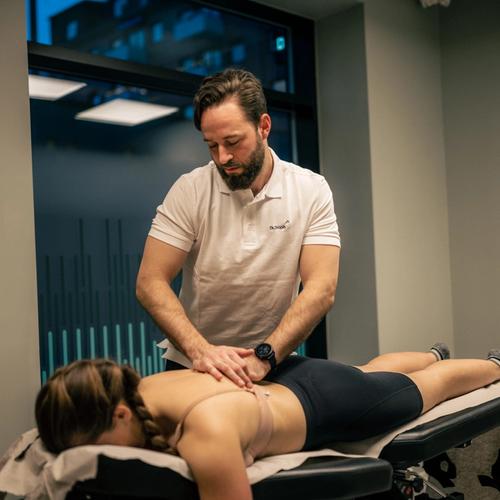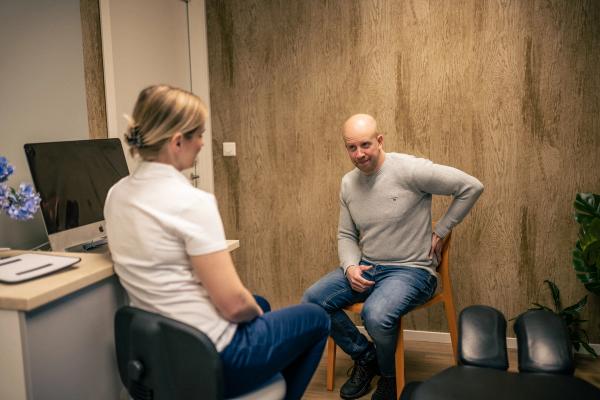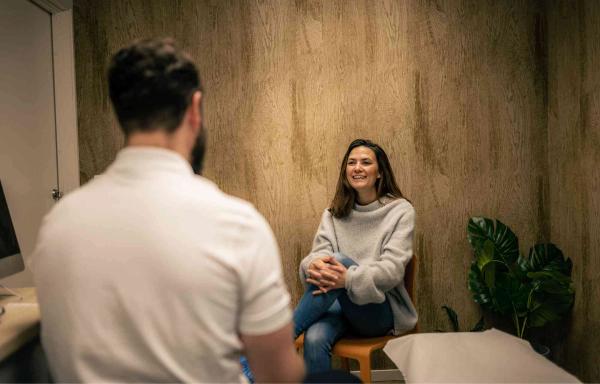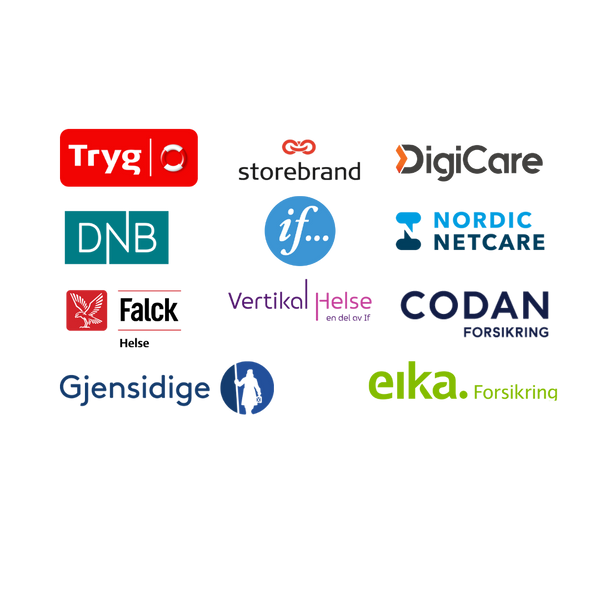Neck disc herniation
Disc herniation in the back is caused by damage to the intervertebral disc between two vertebrae. The condition can be very painful and often leads to short-term functional impairment. If the prolapse presses against a nerve root, radiating pain often occurs, from the area of the herniation.
At Dr. Dropin, we have skilled practitioners who can assess your back issues and help you receive the appropriate treatment.
See availability
What are you looking for?
Symptoms of back herniation
Often, the following symptoms can be experienced with a herniated disc in the lower back:
- Pain in the lower back
- Radiating pain in the legs
- Numbness/tingling/reduced feeling in the leg
- Loss of strength in the leg/foot may occur
Sometimes the condition is more serious. If you experience the following symptoms, seek medical help as soon as possible:
- Leakage of urine or feces or difficulty emptying the bladder
- Loss of feeling in the groin and inside of the thighs.
- Reduced strength in both legs.
Please note that these symptoms can have various causes, and it is important to seek professional help for an accurate diagnosis if you suspect this condition.
See availability
Treatment and prognosis
Treatment of lower back pain often involves different approaches to achieve specific treatment goals. Physiotherapists and chiropractors can play a vital role in helping patients manage these issues. Here are some common treatment measures:
- Pain relief: Through manual techniques such as joint adjustments, massage, and trigger point therapy, lower back pain can be reduced.
- Improved mobility: Through joint adjustments, soft tissue treatments, and specific stretching exercises, we can enhance the mobility and flexibility of the back.
- Strength training: Gradually introducing strength exercises for the back muscles can improve muscle strength and support the back's function.
- Functional rehabilitation: The goal is to assist patients in gradually returning to daily activities, work, and exercise, with an emphasis on restoring optimal back function.
It's important to understand that the treatment for lower back pain should be tailored to individual needs and may vary from person to person. A thorough evaluation and close collaboration with an experienced physiotherapist or chiropractor are essential for developing an effective treatment plan that suits each individual.
When should you book an appointment?
If you recognize the symptoms above and are experiencing any of the following issues, we recommend seeking professional guidance:
- Pain or reduced mobility that has persisted for more than a week without improvement.
- Severe symptoms that you need assistance in reducing quickly.
- Symptoms that cause you concern or that you believe may be due to more serious conditions.
Remember that early assistance from a therapist can reduce the duration of your issues and contribute to achieving the best possible outcome. You should never worry that your problems are "too small" - we take all types of issues seriously.
See availability
Do you want guidance to find out which treatment suits you best?

Telephone
Authorized healthcare personnel assist you over the phone. We answer the phone within 60 seconds. Free of charge.

Find therapist
Find a therapist that suits you and your needs by filtering on one or more criteria.
Use your health insurance
We cooperate with all the major insurance companies, so that you can use your health insurance with us if you have low back pain or other problems.
Read more about how to use your health insurance here
What can you do by yourself?
While treatment for lower back pain typically involves professional guidance and therapy, there are several measures you can take on your own to alleviate symptoms and improve your lower back's condition:
Follow recommended exercises: If your therapist has provided you with home exercises, it's crucial to perform them regularly.
Stay active: Gentle activities like walking, preferably in uneven terrain, can expedite recovery and reduce pain.
Pain relief: Occasionally, pain can be reduced by using an ice pack, heating pad (or a warm shower), or performing gentle movements.
Medications: Use over-the-counter pain relievers as directed by a doctor.
Ergonomics: Adapt your workspace to find a work position that minimizes discomfort. Try adjusting your desk to lower or raise it. It's also wise to alternate between sitting and standing during work.
Adjust your activities: Avoid activities that lead to prolonged exacerbation of back pain (more than 12 hours).
Communicate with your therapist: Maintain an open dialogue with your therapist so that the treatment plan can be adjusted to any changes you experience.
If you haven't had your back pain examined or have strayed from the treatment plan, it's recommended to seek further guidance from healthcare professionals.
See availabilityFrequently asked questions about disc herniations of the back
What is a herniated disc?
A herniated disc, occurs when the soft tissue (the nucleus) inside the intervertebral disc is pushed out through the outer layer. This can lead to pain, numbness, or weakness in the surrounding areas.
What is a herniated disc?
A herniated disc, occurs when the soft tissue (the nucleus) inside the intervertebral disc is pushed out through the outer layer. This can lead to pain, numbness, or weakness in the surrounding areas.
What are the causes of a herniated disc?
The most common causes of a herniated disc include aging, injuries, wear and tear, and strain. There are also genetic factors that may play a role.
What are the causes of a herniated disc?
The most common causes of a herniated disc include aging, injuries, wear and tear, and strain. There are also genetic factors that may play a role.
What are the symptoms of a herniated disc?
Symptoms can vary, but common signs of a herniated disc include pain, numbness, tingling, or weakness in the affected area. If the herniation presses on a nerve, it can also cause radiating pain into the arms or legs.
What are the symptoms of a herniated disc?
Symptoms can vary, but common signs of a herniated disc include pain, numbness, tingling, or weakness in the affected area. If the herniation presses on a nerve, it can also cause radiating pain into the arms or legs.
How is a herniated disc diagnosed?
A herniated disc is typically diagnosed through a combination of a medical history, physical examination, and imaging tests such as X-rays, MRI, or CT scans.
How is a herniated disc diagnosed?
A herniated disc is typically diagnosed through a combination of a medical history, physical examination, and imaging tests such as X-rays, MRI, or CT scans.
What are the treatment options for a herniated disc?
Treatment options can include rest, physical therapy, pain-relief medications, injections, and in some cases, surgery to remove the herniated part of the disc.
What are the treatment options for a herniated disc?
Treatment options can include rest, physical therapy, pain-relief medications, injections, and in some cases, surgery to remove the herniated part of the disc.
How long does it take to recover from a herniated disc?
The time it takes to recover from a herniated disc varies depending on the severity, the treatment method, and individual factors. Some patients experience significant improvement within weeks to months, while others may need more time. It is important to follow the advice of healthcare professionals and therapists for a successful recovery.
How long does it take to recover from a herniated disc?
The time it takes to recover from a herniated disc varies depending on the severity, the treatment method, and individual factors. Some patients experience significant improvement within weeks to months, while others may need more time. It is important to follow the advice of healthcare professionals and therapists for a successful recovery.